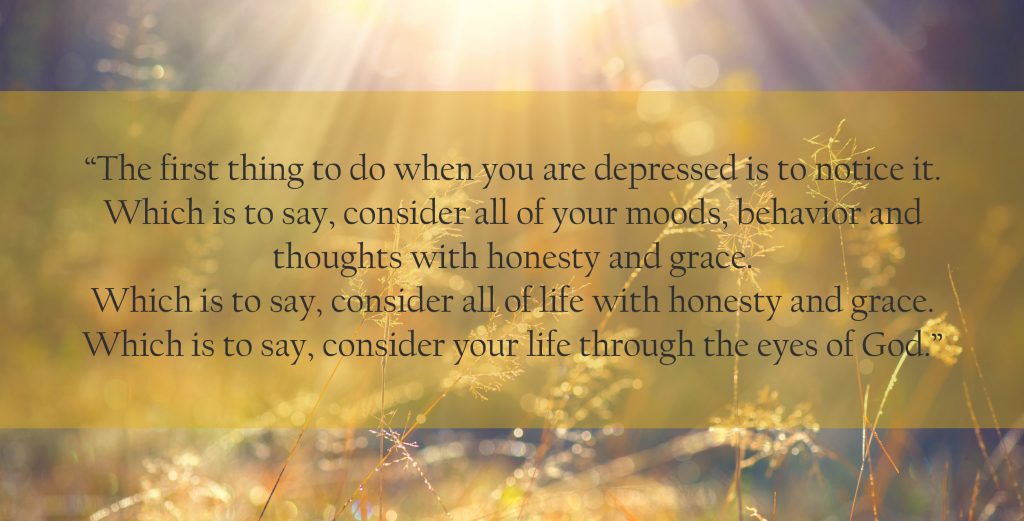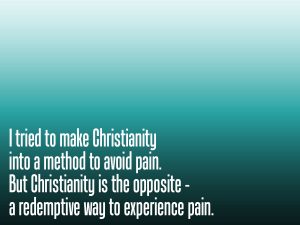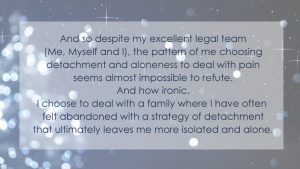The First Thing to Do When you are Depressed

The first thing to do when you are depressed is to notice it.
That sentence may sound silly to you. ‘Of course, I notice it! – I feel it, don’t I,’ you might say. But not so fast. We often don’t notice what we feel. Emotions almost always have a head start over our head (our thinking). We can be hours into a mood before we put a name to it. Often, it is others who ‘helpfully’ point out that something is going on, “What’s wrong with you!”
If we are feeling depressed, by the time we hear a sentence like that, our thinking is already colored and we hear it as a criticism – even if it was said sweetly or with concern.
So at that point, we aren’t really ‘noticing’ our mood. Instead, we are judging it. “What’s wrong with me?” Or we are blaming, “I’ve had it with this job.” Or denying it, “It’s nothing, I’m just tired.” Most often, we don’t tend to notice depression; we react to it with judgement or denial. Both judgement and denial feed the negative spiral of depression. Ironically, our reaction to feeling bad is to fight it with even ‘badder’ feelings; anger, shame, guilt and blame. Our first impulse is to ‘fight fire with fire’ – negative energy with negative energy.
But notice ‘noticing’. Noticing is nonjudgmental, it observes what is there and kindly tells the truth about it. When Jesus warned us about judging the speck in our brother’s eye, He doesn’t recommend that we become harsh to ourselves instead. He simply asks, “Why do you not notice the log in your own eye?” The word He chooses is ‘katanoeó: to take note of, perceive.’ Even as Jesus is warning us not to judge our brother, He is urging us to give the same kindness and honesty to ourselves. Don’t judge; notice.
Noticing your depression feeds a different kind of spiral, a healthy upward spiral. If someone asks you, “What’s wrong?” Why not simply explore the question? “Hmmm, now that you mention it, I do feel irritable and under that, I feel sadness.” Before you criticize yourself, let the emotions signal you that something might need looking into. You don’t criticize the warning lights on your dashboard, do you? (Well ok, some of you do – but it isn’t productive.)
Reacting to depression creates an unhealthy spiral. Noticing sets up a healthy spiral. Noticing considers what you are actually feeling (even underneath irritation, or anger) and provides the space to ask, “OK, there it is. Now, how do I want to care for my sadness, fear or _____?” That’s a much better question. It is a humble question that believes God wants something good for us. And, as humility grows, you might even ask for help. And then, when a little grace comes your way, you might even be willing to receive it. Look at that; honesty, openness, receiving – precisely the things that bring hope, precisely the things that actually help depression.
The first thing to do when you are depressed is to notice it. Which is to say, notice all of your moods, behaviors and thoughts with honesty and grace. Which is to say, notice all of life with honesty and grace. Which is to say, consider your life through the eyes of God.
 Roger Edwards joined The Barnabas Center in 1991. He works with both with individuals and couples, helping people confess their need and embrace their available choices to lead healthier lives. Roger also teaches and leads discussion groups and retreats applying the Gospel to everyday life. He is a licensed professional counselor (LPC), holds a master’s degree in biblical counseling from Grace Theological Seminary in Indiana and earned a bachelor’s degree in engineering from the University of North Carolina at Charlotte. He is married to Jean and they have seven children and nine grandchildren.
Roger Edwards joined The Barnabas Center in 1991. He works with both with individuals and couples, helping people confess their need and embrace their available choices to lead healthier lives. Roger also teaches and leads discussion groups and retreats applying the Gospel to everyday life. He is a licensed professional counselor (LPC), holds a master’s degree in biblical counseling from Grace Theological Seminary in Indiana and earned a bachelor’s degree in engineering from the University of North Carolina at Charlotte. He is married to Jean and they have seven children and nine grandchildren.








